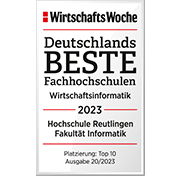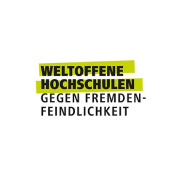
CALL FOR APPLICATIONS
Interdisciplinary Studies between Software Business, Artificial Intelligence, Customer Orientation and Computer Science: Innovations for Digital Marketing, Software Defined Products and Customer Value
Context
In an era characterized by rapid technological progress and complex business environments, the integration of marketing and IT is becoming increasingly important. A modern understanding of customer orientation and software is characterized by diverse content: Innovative (software-based) products and services, hybrid sales and eCommerce scenarios, digital communication, dynamic and usage-based pricing models, applied artificial intelligence, sustainability in business models, customer experience, software-based operations, and much more.
However, the following still applies: customer benefits create company benefits. A convincing design of customer relationships is of crucial importance for every type of business model. The influence of IT has fundamentally changed marketing itself in recent years. This transformation has not yet been sufficiently researched.
The PhD program “Interdisciplinary Studies between Software Business, Artificial Intelligence, Customer Orientation and Computer Science” is designed to equip industry researchers with the knowledge and skills to navigate the intersection of these two fields. The program fosters a deep understanding of digital strategies, software business, marketing, advanced research methods (e.g. design science research) so that graduates are able to shape technological change in companies. This call for applications addresses the aims, structure, content, research approaches and career prospects of this unique PhD program. For Intake 2025, 12 PhD places will be offered.
Program goals and structure
The PhD program “Interdisciplinary Studies between Software Business, Artificial Intelligence, Customer Orientation and Computer Science” usually takes three years, depending on the specific progress made during the program (e.g. in the form of publications). Prerequisites for admission are a first-class Master's degree in a relevant sub-discipline such as business administration, business informatics or engineering, significant professional experience, a target-oriented research proposal and a convincing personality.
The program achieves the following core objectives:
- Knowledge building: Students acquire a profound understanding of relevant sub-topics in the fields of marketing, computer science and research methodology.
- Interdisciplinary research competence: Students develop the ability to produce relevant research results at the interface between marketing and computer science.
- Methodological competence: Students acquire sound expertise in the key research methods used in global competition.
- Impact: Students generate a measurable impact for companies and society through the results of the program, e.g. through publications, prototypes, start-ups or patents.
Curriculum
The curriculum integrates PhD seminars and colloquia from the fields of marketing, computer science and methodology in order to promote a holistic qualification. The core content includes:
- Digital marketing in theory and practice.
- Modern computer science: concepts of computer science for the development of digital solutions, software and software engineering, enterprise architecture management, etc.
- Quantitative methods for research and management: Statistical and mathematical techniques for business analysis and decision-making.
- Qualitative methods: Explorative interviews, expert surveys and focus groups as a basis for concept-related research approaches.
- Scientific impact: publications in leading formats, patents, start-ups, projects with student groups, empirical research, ethics of research, use of GenAI.
- General research methodology: research paradigms, literature and document analysis, structure of publications, publication of results at globally relevant conferences.
Research opportunities
The PhD program offers a wide range of research topics that reflect the many overlaps between marketing and computer science. Possible research areas are derived from concrete questions of business practice as well as from the academic knowledge base of marketing research. The results of the PhD procedures are relevant for the academic community and business practice.
Research methods
Students will apply a variety of research methods that combine qualitative and quantitative approaches to answer complex interdisciplinary questions. These methods include:
- Case studies: in-depth analysis of specific organizations or projects to gain insights and best practices.
- Surveys and interviews: Gathering data from stakeholders to understand trends and perspectives.
- Mathematical modeling: developing models to simulate business processes and predict outcomes.
- Experimental design: Conducting experiments to test hypotheses and evaluate measures.
- Data analysis: Using large amounts of data to uncover patterns and inform decision-making.
- Design science research: developing relevant artifacts and prototypes for application in business practice.
International collaboration
The PhD program is a pioneering initiative that focuses on global collaboration and cross-cultural academic exchange. The program is structured through a unique partner model involving renowned universities from Israel (Tel Aviv University), Finland (Aalto University), Switzerland (Universität St. Gallen) and the UK (UoW). The international structure is designed to provide students with diverse perspectives, access to world-class research institutions and the opportunity to collaborate with leading experts.
Science and practice
The Industrial PhD program is an innovative educational approach that allows PhD candidates to simultaneously work in a company and conduct academic research. This dual approach is designed to bridge the gap between academia and industry and promote practical applications through scientific research, while at the same time promoting the professional development of the PhD candidate. Industrial PhD programs are becoming increasingly popular as they are of great benefit to both the PhD candidates and supporting companies, while providing valuable insights and advances to the academic world.
Dissertation and defense
The linchpin of the PhD program is the dissertation, a relevant piece of research that provides new insights into the field of study. The dissertation process includes:
- Preparation of a research proposal: Submission and defense of a research proposal describing the planned research project.
- Implementation and publication of sub-projects: Carrying out research projects, analyzing the results and writing at least three sub-publications in journals and at conferences.
- Defense: Presentation of the dissertation to a review committee, defense of the methodology, results and conclusions.
Career Opportunities
Graduates of the PhD program have a wide range of career opportunities in academia and industry. Career options in the academic world include teaching as a private lecturer, post-doctoral positions and appointment to a professorship. From the perspective of business practice, the PhD program qualifies students for management positions and opens up a significant expansion of their own network. This provides a comprehensive and challenging path for those interested in bridging the gap between technology and business and achieving real impact through research. With a solid curriculum, diverse research opportunities and promising career prospects, the program equips PhD candidates with the knowledge and skills they need to make a significant contribution to business and research. Due to the digital transformation, the need for qualified experts who can navigate this intersection will continue to grow, making the program an excellent investment for one's future.
Call for Applications
Call for applications for the program starting in October 2026 is open until September 30, 2026. Expressions of interest in the program can be sent informally by email to Prof. Dr. Alexander Rossmann. Following the expression of interest, further information on the application process and the documents to be submitted will be sent.





